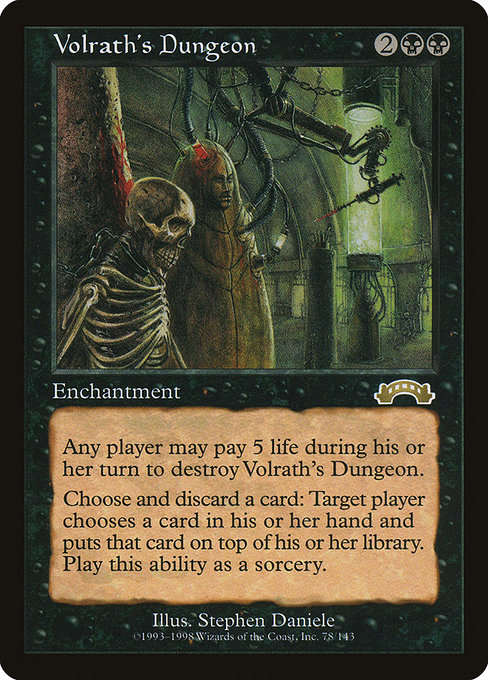
Image courtesy of Scryfall.com
Art reinterpretations in Secret Lair: Volrath's Dungeon and the Legacy of Exodus
In the grand tapestry of Magic: The Gathering, art is more than color and shape—it’s a doorway to mood, memory, and the stories we tell at the table. Secret Lair has sharpened that doorway, turning beloved cards into conversations about artists, eras, and the ways a single image can shift our interpretation of a card’s mechanics. One striking example is the black enchantment Volrath's Dungeon from Exodus, a 1998 relic whose sinister, labyrinthine vibe invites both tactical rigor and narrative curiosity. The original piece by Stephen Daniele captures a claustrophobic fortress where every shadow hints at a choice—and every choice carries a price. 🧙♂️🔥
Volrath's Dungeon is a deceptively simple yet deeply punishing piece of design. With a mana cost of {2}{B}{B}, it sits squarely in the realm of midrange control that rewards careful tempo and resource management. Its text is a two-step puzzle: you may pay 5 life to destroy the enchantment (a price you gladly accept when the board state favors you, but a somber reminder of black’s risk-reward calculus), and you may discard a card to force a target player to put a card from their hand on top of their library. The sorcery-speed discard line introduces a nuanced mind game—who controls information, who bears the cost, and when to strike to maximize disruption. All the while, black mana’s shadowy identity underlines a theme of sacrifice, secrecy, and strategic leverage. 🔮
What makes Secret Lair art reinterpretations so compelling is how they refract the same frame through a contemporary lens. Imagine a version of Volrath's Dungeon reimagined with bolder contrasts, a more angular dungeon corridor, or perhaps a cosmic lattice where the dungeon walls bend and breathe under a moonlit sky. The art becomes a new language for the card’s flavor: the menace remains, but the mood can swing—from suffocating dread to cinematic intrigue. These variants don’t erase the card’s history; they deepen it, offering a fresh entry point for veterans who remember the Exodus era and for newer players who encounter the piece through a modern artist’s gaze. 🎨⚔️
“The dungeon may be the same, but the doorways keep changing.”
From a gameplay perspective, the enduring appeal of Volrath's Dungeon lies in its audacious negotiation of risk. The self-destruction clause—pay 5 life to destroy this enchantment—creates a narrative of restraint: you pay your life to preserve control, quite literally betting on the board state staying favorable. The alternate line—discard a card to force a top-of-library shuffle—introduces a secondary axis of play, rewarding players who can read the table and anticipate the opponent’s next draw. In older formats, this card offered a rare blend of graveyard-agnostic contamination and hand manipulation that could tilt a game in a single, patient moment. The art reinterpretations act as a reminder that these choices are simultaneously strategic and story-driven. 🧠💎
Collectors and lore enthusiasts alike savor Secret Lair’s art variants precisely because they transform a familiar print into a collectible conversation piece. Exodus’s Volrath's Dungeon is already a window into late-90s Magic aesthetics—grainy production, bold line work, and a mood that sits somewhere between dungeon-crawl fantasy and conspiracy-drenched sorcery. When a modern artist steps in to reframe that same card, it’s not just about a different color palette; it’s about how the image reframes our memory of the game’s history. The result is a richer, more layered appreciation for the card’s place in the pantheon of black’s tactical toolkit. 🧙♀️🎲
Beyond the spectacle, this conversation intersects with how we collect, trade, and display our passions. Exodus-set cards like Volrath's Dungeon remind us how long Magic has been flirting with the idea that art is part of the gameplay. A Secret Lair variant nudges players toward a broader appreciation—art as a gateway to community, as a catalyst for discussion, and as a bridge between decades of MTG culture. The enchantment’s text remains a stubborn, elegant puzzle, and the new art variants give us a fresh lens through which to view that puzzle. The pairing of lore, mechanics, and aesthetic reinterpretation is a quintessentially MTG experience: old strategy, new sensations, and endless possibilities. 🧙♂️💬
If you’re looking for a practical way to celebrate this cross-generational magic in your everyday life, a stylish accessory can be a delightful companion. The Digital Vault shop presents a playful cross-promotional option—a MagSafe-compatible phone case with a card holder. It’s a compact tribute to the card-nerd lifestyle: rugged practicality for travel, a nod to the card’s enduring legacy, and a touch of modern flair that keeps your deck-building on your mind while you’re on the go. It’s not just about carrying cards; it’s about carrying the magic forward, one stylish accessory at a time. 🔥💎
Phone Case with Card Holder MagSafe-CompatibleMore from our network
- https://transparent-paper.shop/blog/post/marketing-in-the-metaverse-strategies-for-immersive-engagement/
- https://transparent-paper.shop/blog/post/blue-hot-giant-in-cassiopeia-reveals-stellar-luminosity/
- https://blog.digital-vault.xyz/blog/post/undersimplify-elevating-player-creativity-in-mtg-design/
- https://blog.digital-vault.xyz/blog/post/shattering-finale-common-misplays-and-how-to-play-it-better/
- https://blog.rusty-articles.xyz/blog/post/hot-34k-k-star-in-sagittarius-revealed-by-blue-color-index/